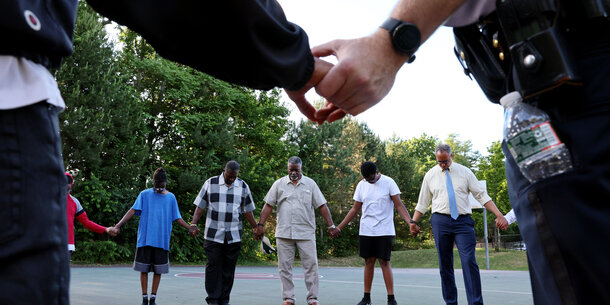The Supreme Court Monday didn’t just rule against thousands of prisoners convicted under racist jury rules permitting nonunanimous verdicts. The Court’s six conservative justices also cast doubt on the Court’s willingness to ever grant retroactive relief to countless other victims of unconstitutional practices and policies. It’s little wonder that Justice Elena Kagan wrote such a potent dissent for the Court’s diminished liberal wing in the case, Edwards v. Vannoy. She knows the scope of what the Court just did, the deplorable restrictions it has just placed on systemic justice reform, and the sneaky way in which it has done it.
Just 13 months ago, in Ramos v. Louisiana, the Court ruled 6–3 that nonunanimous jury rules, in place then only in Oregon and Louisiana, unconstitutionally infringed on the Sixth Amendment rights of defendants to a trial by jury. The idea behind the rules, explicitly created to help enforce white supremacy, were simple and diabolical. By allowing convictions with 10–2 verdicts, state lawmakers in Louisiana could still get the convictions they wanted against Black people (or in the case of Oregon, Jews), even if one or two jurors were Black or Jewish or simply unconvinced of the prosecution’s case or empathetic with a criminal defendant.
Last April, Justices Neil Gorsuch and Brett Kavanaugh joined with their four liberal colleagues (Justice Ruth Bader Ginsburg was then still alive) in ending that odious practice. It was good news for Evangelisto Ramos, the named plaintiff in the case, who had been convicted and sentenced to life without parole even though two of his trial jurors voted to acquit him. In 48 states, the justices noted, Ramos would not have been convicted. In Louisiana, he was convicted, based on a law so discriminatory it could not stand constitutional scrutiny. Gorsuch ended his majority opinion in Ramos last April with these words:
“On what ground would anyone have us leave Mr. Ramos in prison for the rest of his life? Not a single Member of this Court is prepared to say Louisiana secured his conviction constitutionally under the Sixth Amendment… In the end, the best anyone can seem to muster against Mr. Ramos is that, if we dared to admit in his case what we all know to be true about the Sixth Amendment, we might have to say the same in some others.
“Every judge must learn to live with the fact he or she will make some mistakes; it comes with the territory. But it is something else entirely to perpetuate something we all know to be wrong only because we fear the consequences of being right.”
And yet this is precisely what Gorsuch and Kavanaugh did Monday in Edwards. They just perpetuated something they knew to be wrong because they feared the consequences of being right. What are the consequences? Allowing thousands of people unfairly convicted by nonunanimous verdicts to seek new trials or other relief. And how did Kavanaugh and company avoid those consequences? By claiming without merit that prohibiting those racist jury rules wasn’t such a big deal after all. It’s a head-spinning reversal — in just 13 months! — justified by a deplorable reading of the Supreme Court’s own precedent.
Had the Court’s conservatives stopped there it would have been bad enough. Except they went further. Knowing they couldn’t rationally argue that Ramos wasn’t a new procedural rule so important that justifies retroactive force — known as a “watershed” rule — they instead overturned the legal standard by which all such watershed procedural rules have been judged for decades. Kavanaugh declared the old precedent for watershed rules “moribund” and “retaining no vitality.” Poof! It was gone. And with it (by Kagan’s own count) the foundation of at least 17 other Supreme Court decisions that have helped individuals wronged by justice systems over the generations.
Many of us who spoke or wrote about the Ramos ruling last spring considered it both an important judicial milestone in the nation’s history and a marker for future reform. And many of us assumed that once the Court had struck down the prospective application of the odious nonunanimous jury rules, the justices would revisit the issue quickly via another case and help the thousands of prisoners who were unjustly convicted under them. After all, hadn’t the Court just done something similar with inhumane juvenile sentences, first striking down mandatory life-without-parole sentences for teenagers and then allowing those affected to seek new sentences?
It’s obvious that Kagan shared that optimism, or least that lack of cynicism, about the work of the Court. Which likely explains the disappointment, even scorn, she expressed for the rationale cited by the majority in defense of Monday’s ruling. Her dissent in Edwards is worth reading not just for what it says about what the Court’s conservatives just did but for what they plan to do in future cases. This is likely the beginning and not the end of judicial clawbacks of justice reform, Kagan is telling us, and it portends more misery for forsaken people sitting in a cell because of a law or policy that has since been voided.
“Ramos will not apply retroactively,” wrote Kagan, “meaning that a prisoner whose appeals ran out before the decision can receive no aid from the change in law it made. So Thedrick Edwards, unlike Evangelisto Ramos, will serve the rest of his life in prison based on a 10-to-2 jury verdict. Only the reasoning of today’s holding resists explanation.” How? Kagan explained: “If there can never be any watershed rules—as the majority here asserts out of the blue—then, yes, jury unanimity cannot be one. The result follows trippingly from the premise. But adopting the premise requires departing from judicial practice and principle.”
Writing for the countless people whose legitimate cases and causes will now never overcome the new legal hurdle established by the Edwards decision, Kagan concluded, “And so too the Court limits the consequences of any similarly fundamental change in criminal procedure that may emerge in the future. For the first time in many decades those convicted under rules found not to produce fair and reliable verdicts will be left without recourse in federal courts.”
Another Supreme Court right without a remedy. Another majority opinion so flawed in its rationale and so transparent in its unjust purpose that it will never stand the test of time. Another cruel dichotomy grounded in neither law nor logic that will add to the suffering of Americans. Another bad day for the unjustly convicted.
The views expressed are the author’s own and not necessarily those of the Brennan Center.


